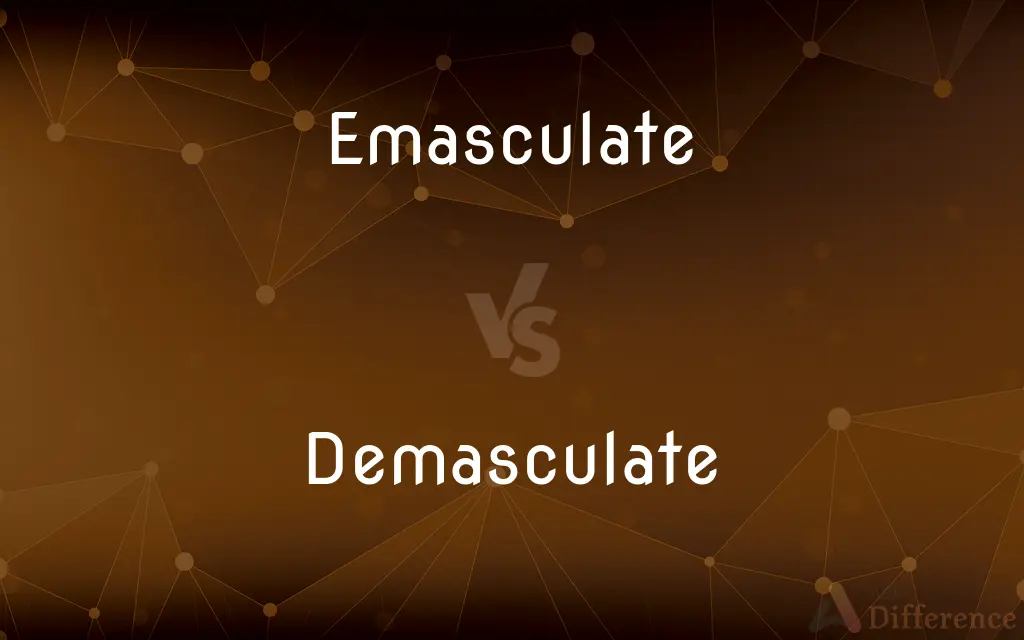Emasculate vs. Demasculate — Which is Correct Spelling?
By Tayyaba Rehman — Updated on September 2, 2023
"Emasculate" means to deprive of strength, vigor, or power; "Demasculate" is a less common term but also implies the removal or loss of masculine qualities.

Table of Contents
Which is correct: Emasculate or Demasculate
How to spell Emasculate?

Emasculate
Correct Spelling

Demasculate
Incorrect Spelling
ADVERTISEMENT
Key Differences
It's essential to understand that while both "Emasculate" and "Demasculate" can be used in contexts that discuss the reduction or removal of manliness or masculine qualities, "Emasculate" also has applications outside this sphere, referring to weakening or reducing the efficacy of something.
Both "Emasculate" and "Demasculate" touch upon the theme of taking away masculinity or strength, though "Emasculate" has broader applications, including the reduction of power or efficacy of any entity, not just males. Meanwhile, "Demasculate" predominantly zeroes in on the loss of masculine traits.
"Emasculate" is a term rooted in the concept of depriving someone or something of its strength or effectiveness. In contrast, "Demasculate," while infrequently used, typically focuses on the removal or diminishment of masculine characteristics or qualities.
Linguistically, "Emasculate" is more widely recognized and established than "Demasculate." While "Emasculate" has historical and broader usages, "Demasculate" is often perceived as a redundant or less formal variant.
Context is crucial when employing these terms. Using "Emasculate" can convey a broader range of meanings, from weakening an institution to depriving a male of his manly essence. "Demasculate" will more strictly revolve around the concept of depriving masculinity.
ADVERTISEMENT
Emasculate Definitions
To castrate a male.
Historically, some singers were emasculated to maintain their high-pitched voices.
To deprive of strength or vigor.
The organization was emasculated by budget cuts.
To deprive of masculine qualities.
He felt emasculated by his inability to protect his family.
To weaken or make less effective.
The new policies could emasculate the effectiveness of the team.
To render nonfunctional or powerless.
Critics argue that the law would emasculate the rights of the citizens.
Deprive (a man) of his male role or identity
He feels emasculated, because he cannot control his sons' behaviour
Make (someone or something) weaker or less effective
The refusal to allow them to testify effectively emasculated the committee
To castrate.
To deprive of strength or vigor; weaken.
Deprived of virility, strength, or vigor.
Deprived of virility or vigor; unmanned, weak.
(transitive) To deprive of virile or procreative power; to castrate, to geld.
(specifically) To remove the entire male genitalia (the testicles, scrotum, and penis) of (a person or animal).
(transitive) To deprive of masculine vigor or spirit; to weaken; to render effeminate; to vitiate by unmanly softness.
Of a flower: to deprive of the anthers.
To deprive of virile or procreative power; to castrate power; to castrate; to geld.
To deprive of masculine vigor or spirit; to weaken; to render effeminate; to vitiate by unmanly softness.
Luxury had not emasculated their minds.
Deprived of virility or vigor; unmanned; weak.
Deprive of strength or vigor;
The Senate emasculated the law
Remove the testicles of a male animal
Having unsuitable feminine qualities
Common Curiosities
What is the origin of "Emasculate"?
It derives from the Latin "emasculare," meaning to castrate.
Can "Demasculate" and "Emasculate" be used interchangeably?
While both deal with reducing masculinity or strength, "Emasculate" has broader applications, making them not always interchangeable.
Is "Demasculate" recognized in all dictionaries?
Not necessarily. It's less common than "Emasculate" and might not appear in all dictionaries.
Is it offensive to use these terms?
Depending on context, it could be perceived as offensive, especially if used to belittle someone's masculinity.
Why might someone use "Demasculate" over "Emasculate"?
Preference or to specifically emphasize the removal of masculine qualities without broader implications.
How often is "Demasculate" used in literature?
It's infrequently used compared to "Emasculate."
Is "Emasculate" a commonly used term?
Yes, "Emasculate" is more commonly used than "Demasculate."
Do these terms only apply to humans?
No, "Emasculate" can apply to entities or systems, while "Demasculate" typically focuses on living beings, mainly humans.
Can "Emasculate" refer to weakening any entity, not just males?
Yes, "Emasculate" can refer to weakening or reducing the efficacy of any entity.
Why is it crucial to be cautious when using these terms?
Given their connotations, they can be perceived as derogatory or offensive, especially if used inappropriately.
Are there synonyms for "Emasculate"?
Yes, words like "weaken," "debilitate," or "neuter" can be synonyms depending on the context.
Can "Emasculate" be used in a medical context?
Yes, historically it referred to castration or the removal of male reproductive organs.
How can one avoid potential misunderstandings when using these words?
Context is essential. Ensure the sentence clearly conveys the intended meaning and avoids unnecessary offense.
Do these terms have equivalents in other languages?
Yes, many languages have words for weakening or reducing masculinity, though exact translations may carry different connotations.
Can these words be used metaphorically?
Absolutely, they can metaphorically represent the weakening or removal of strength, power, or masculinity.
Share Your Discovery

Previous Comparison
Amoung vs. Among
Next Comparison
Operater vs. OperatorAuthor Spotlight
Written by
Tayyaba RehmanTayyaba Rehman is a distinguished writer, currently serving as a primary contributor to askdifference.com. As a researcher in semantics and etymology, Tayyaba's passion for the complexity of languages and their distinctions has found a perfect home on the platform. Tayyaba delves into the intricacies of language, distinguishing between commonly confused words and phrases, thereby providing clarity for readers worldwide.














































